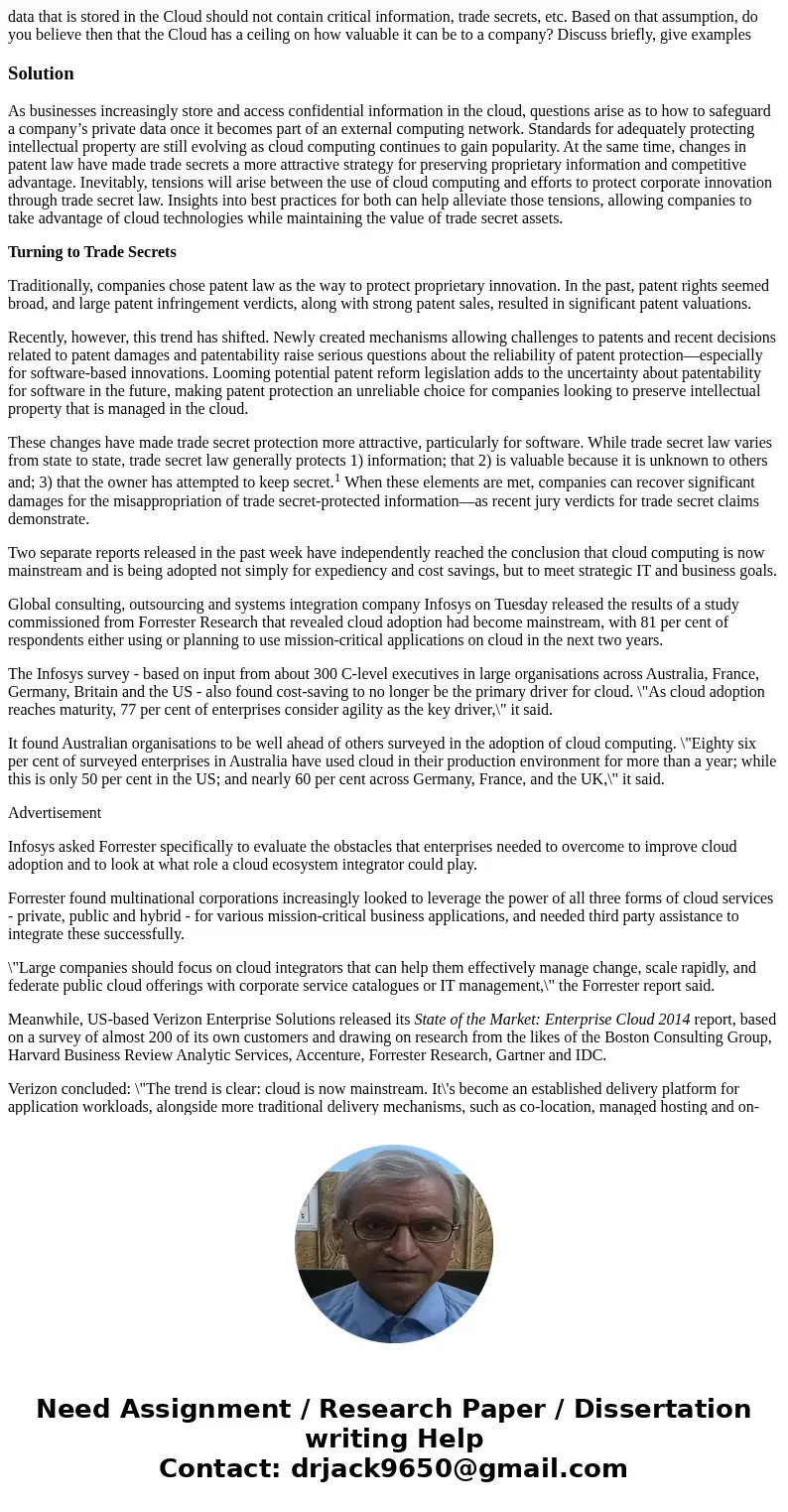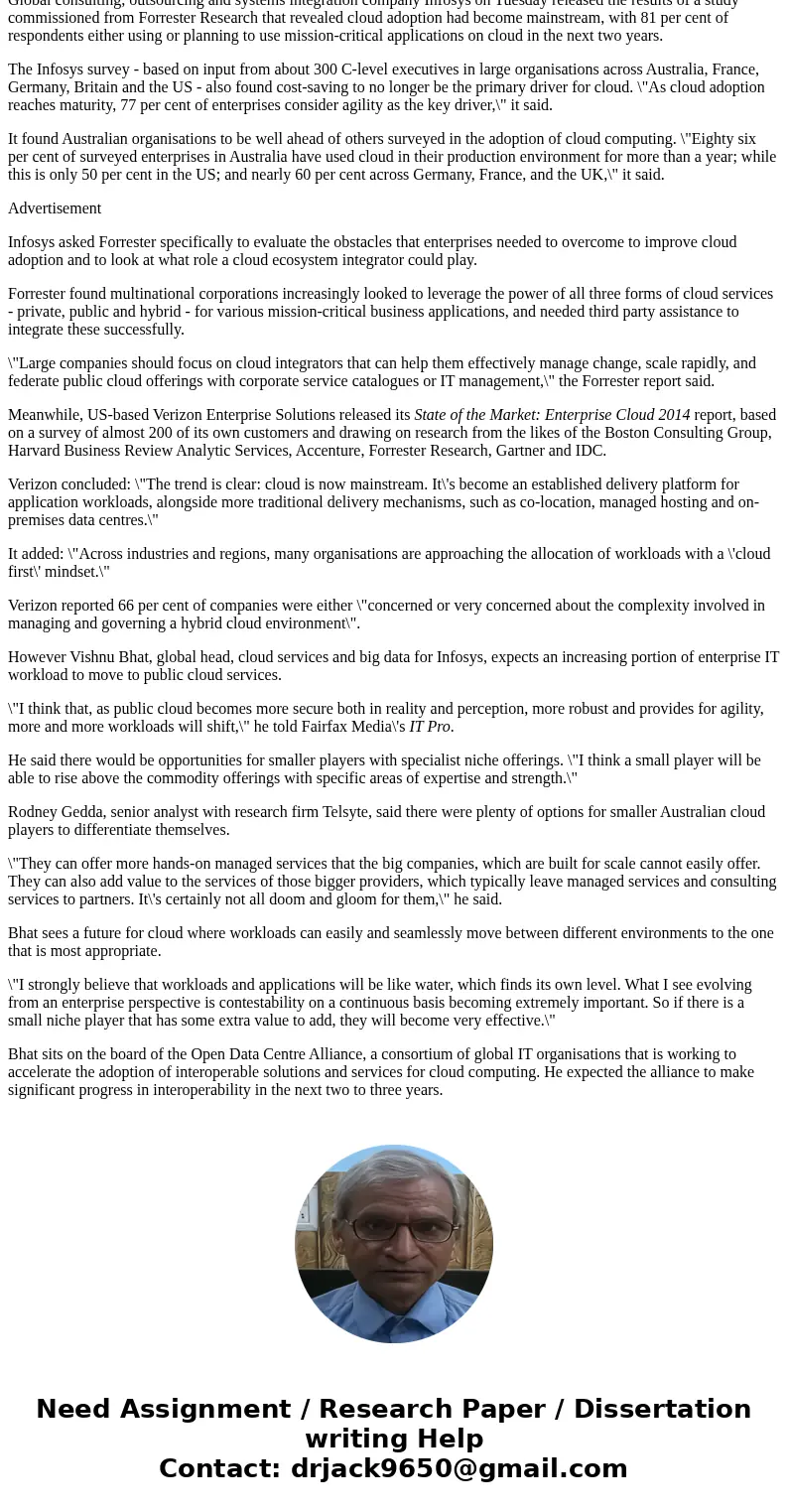data that is stored in the Cloud should not contain critical
data that is stored in the Cloud should not contain critical information, trade secrets, etc. Based on that assumption, do you believe then that the Cloud has a ceiling on how valuable it can be to a company? Discuss briefly, give examples
Solution
As businesses increasingly store and access confidential information in the cloud, questions arise as to how to safeguard a company’s private data once it becomes part of an external computing network. Standards for adequately protecting intellectual property are still evolving as cloud computing continues to gain popularity. At the same time, changes in patent law have made trade secrets a more attractive strategy for preserving proprietary information and competitive advantage. Inevitably, tensions will arise between the use of cloud computing and efforts to protect corporate innovation through trade secret law. Insights into best practices for both can help alleviate those tensions, allowing companies to take advantage of cloud technologies while maintaining the value of trade secret assets.
Turning to Trade Secrets
Traditionally, companies chose patent law as the way to protect proprietary innovation. In the past, patent rights seemed broad, and large patent infringement verdicts, along with strong patent sales, resulted in significant patent valuations.
Recently, however, this trend has shifted. Newly created mechanisms allowing challenges to patents and recent decisions related to patent damages and patentability raise serious questions about the reliability of patent protection—especially for software-based innovations. Looming potential patent reform legislation adds to the uncertainty about patentability for software in the future, making patent protection an unreliable choice for companies looking to preserve intellectual property that is managed in the cloud.
These changes have made trade secret protection more attractive, particularly for software. While trade secret law varies from state to state, trade secret law generally protects 1) information; that 2) is valuable because it is unknown to others and; 3) that the owner has attempted to keep secret.1 When these elements are met, companies can recover significant damages for the misappropriation of trade secret-protected information—as recent jury verdicts for trade secret claims demonstrate.
Two separate reports released in the past week have independently reached the conclusion that cloud computing is now mainstream and is being adopted not simply for expediency and cost savings, but to meet strategic IT and business goals.
Global consulting, outsourcing and systems integration company Infosys on Tuesday released the results of a study commissioned from Forrester Research that revealed cloud adoption had become mainstream, with 81 per cent of respondents either using or planning to use mission-critical applications on cloud in the next two years.
The Infosys survey - based on input from about 300 C-level executives in large organisations across Australia, France, Germany, Britain and the US - also found cost-saving to no longer be the primary driver for cloud. \"As cloud adoption reaches maturity, 77 per cent of enterprises consider agility as the key driver,\" it said.
It found Australian organisations to be well ahead of others surveyed in the adoption of cloud computing. \"Eighty six per cent of surveyed enterprises in Australia have used cloud in their production environment for more than a year; while this is only 50 per cent in the US; and nearly 60 per cent across Germany, France, and the UK,\" it said.
Advertisement
Infosys asked Forrester specifically to evaluate the obstacles that enterprises needed to overcome to improve cloud adoption and to look at what role a cloud ecosystem integrator could play.
Forrester found multinational corporations increasingly looked to leverage the power of all three forms of cloud services - private, public and hybrid - for various mission-critical business applications, and needed third party assistance to integrate these successfully.
\"Large companies should focus on cloud integrators that can help them effectively manage change, scale rapidly, and federate public cloud offerings with corporate service catalogues or IT management,\" the Forrester report said.
Meanwhile, US-based Verizon Enterprise Solutions released its State of the Market: Enterprise Cloud 2014 report, based on a survey of almost 200 of its own customers and drawing on research from the likes of the Boston Consulting Group, Harvard Business Review Analytic Services, Accenture, Forrester Research, Gartner and IDC.
Verizon concluded: \"The trend is clear: cloud is now mainstream. It\'s become an established delivery platform for application workloads, alongside more traditional delivery mechanisms, such as co-location, managed hosting and on-premises data centres.\"
It added: \"Across industries and regions, many organisations are approaching the allocation of workloads with a \'cloud first\' mindset.\"
Verizon reported 66 per cent of companies were either \"concerned or very concerned about the complexity involved in managing and governing a hybrid cloud environment\".
However Vishnu Bhat, global head, cloud services and big data for Infosys, expects an increasing portion of enterprise IT workload to move to public cloud services.
\"I think that, as public cloud becomes more secure both in reality and perception, more robust and provides for agility, more and more workloads will shift,\" he told Fairfax Media\'s IT Pro.
He said there would be opportunities for smaller players with specialist niche offerings. \"I think a small player will be able to rise above the commodity offerings with specific areas of expertise and strength.\"
Rodney Gedda, senior analyst with research firm Telsyte, said there were plenty of options for smaller Australian cloud players to differentiate themselves.
\"They can offer more hands-on managed services that the big companies, which are built for scale cannot easily offer. They can also add value to the services of those bigger providers, which typically leave managed services and consulting services to partners. It\'s certainly not all doom and gloom for them,\" he said.
Bhat sees a future for cloud where workloads can easily and seamlessly move between different environments to the one that is most appropriate.
\"I strongly believe that workloads and applications will be like water, which finds its own level. What I see evolving from an enterprise perspective is contestability on a continuous basis becoming extremely important. So if there is a small niche player that has some extra value to add, they will become very effective.\"
Bhat sits on the board of the Open Data Centre Alliance, a consortium of global IT organisations that is working to accelerate the adoption of interoperable solutions and services for cloud computing. He expected the alliance to make significant progress in interoperability in the next two to three years.


 Homework Sourse
Homework Sourse